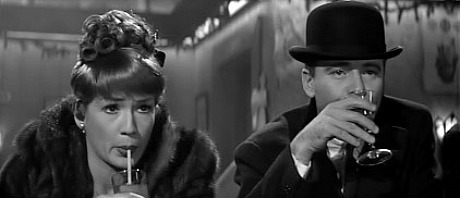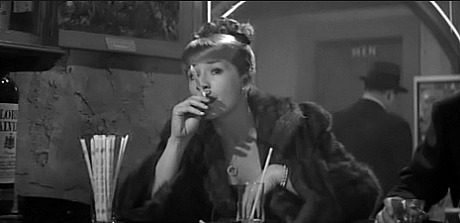Every film buff on the planet knows Hope Holiday, a 75 year-old actress whose career peaked 53 years ago. But it was a helluva peak. She played Mrs. Margie McDougal, a lonely lady with a squeaky, spunky voice whom Jack Lemmon‘s C.C. Baxter meets in an Upper West Side bar in Billy Wilder‘s The Apartment (’60). She and Baxter speak about loneliness on Christmas Eve (“‘Twas the night before Christmas and all through the house, not a creature was stirrin’…nothin’…no action!”), and about her husband (“Looks like a little chihuahua”) doing time in a Cuban prison. They close the place down and retire to Baxter’s apartment. Baxter finds Fran Kubelik (Shirley MacLaine) passed out on his bed from an overdose of sleeping pills, and promptly kicks Margie out. “Some sexpot!,” she brays as Baxter slams the door.

(l.) Hope Holiday as Mrs. Margie McDougal, (r.) Jack Lemmon as C.C. Baxter in Billy Wilder’s The Apartment (’60).

Anyway, Mrs. McDougal has stormed back into the world of show business with a Sunday morning Facebook post that attacks The Wolf of Wall Street, which she’d seen the night before. “Three hours of torture,” she calls it. “Same disgusting crap over and over again. After the film they had a discussion which a lot of us did not stay for. The elevator doors opened and Leonardo [DiCaprio], Martin [Scorsese] and a few others got out. [And] then a screenwriter ran over to them and started screaming “shame on you…disgusting.”
As the screenwriter went into his tirade, “I stood there with my mouth hanging open and then joined in, [saying] ‘you ought be ashamed of yourself,” Hope reports. “Talented men putting such junk on the screen and thinking it was funny. A fight almost ensued. I ran down the stairs. Some people liked it but most didn’t. I hated it. What egos! The least they could have done was cut an hour out of it. Then I saw the name Danny Dimbort up on the credits and nearly threw up — schlock king — shades of Nu Image films.”
In other words, the metaphorical scheme of The Wolf of Wall Street — delivering a darkly comical indictment of 1% greed and excess by depicting the absurdity of Jordan Belfort‘s shallow, more-more-more, money-lathered lifestyle — went right over Holiday’s head. Most people digest movies solely in terms of subject matter and emotional warmth. They all say “what happens in it?” and “did it make you cry?” Five or ten percent (if that) say, “What was it about? What was the metaphor, the thematic thrust? What did it say about the world out there, about who we are?”
For whatever reason Holiday doesn’t identify the boisterous screenwriter. She probably thinks he/she wouldn’t want to suffer the notoriety. Trust me, no screenwriter worth his or her salt would dare attack Scorsese in an unseemly public way. It shows a lack of breeding and respect for an industry legend. Such an act would kill his/her chances of ever taking a meeting again.
Holiday then says she “liked” American Hustle but “wasn’t in love with it…confusing.”
Hope’s definitive statement: “Are there really any good films any more? Maybe it’s just me.”
This is exactly what I’ve been talking about. Last April I suggested that the Academy should adopt a weighted voting system as a way of minimizing the impact of the likes and dislikes of out-to-pasture Academy members. Not in a dismissive or disrespectful way, but moderately and appropriately.
Hope is a good lady. She was memorable in The Apartment and had a peppy supporting role as a prostitute in Wilder’s Irma La Douce, and she had a decent part in The Rounders. She’s certainly entitled to her opinions. But people like Hope have been slowly calcifying and out of the industry swirl of things for decades, and — due respect — they don’t deserve to influence Oscar tallies as much as currently or recently employed filmmakers.
“If the Academy wants to be part of the world as it is right now and have the Oscar winners reflect this,” I explained, “it has to reduce the influence of people whose professional peaks happened 15 or 20 or more years ago. These people will retain membership and all the priveleges that go with that, but their votes won’t count as much as those who are actively working and contributing to the films of today, or at least films made within the last five to ten years — simple.
“Every year Academy members will be asked online ‘how recently have you worked on a feature film destined for theatrical or a film or series destined for cable or streaming?’ If the last film you worked on was released ten or more years ago, you get a single vote and become a C-grade voter. If the last film you have worked on was released between five and ten years ago, you get two votes and become a B-grade voter. And if you’ve worked on a film made and released within the last five years, you get three votes and becomes an A-grade voter.”












